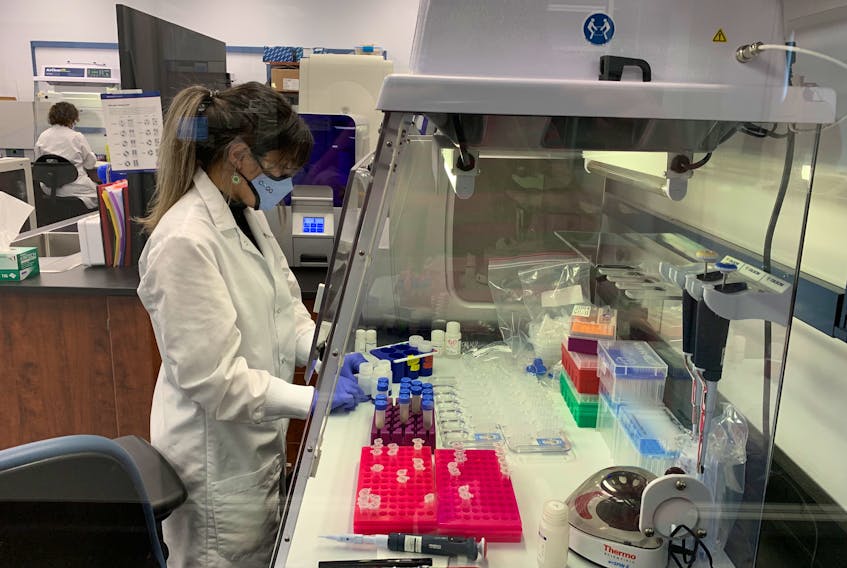People most often hear about DNA when it’s brought up in crime procedurals, where investigators hope a shred of genetic evidence will help them catch a prime suspect.
But the utility of sifting through genetic code can be applied in lots of different ways. A St. John’s-based company is doing just that, and its unique work is attracting the attention of hefty cheque-books.
On Thursday, Canada’s Ocean Supercluster announced $4.9 million in funding for a new project led by eDNAtec Inc. Working alongside a variety of partners — Petroleum Research Newfoundland and Labrador, Nunavut Fisheries Association and Fisheries and Oceans Canada (DFO) — the funds will support research and development activity related to eDNAtec’s trademarked OceanDNA System. The project directly supports 17 jobs, and graduating university students will also have the opportunity to engage with it.
Mark Ploughman, eDNAtec’s senior advisor on sustainability, explained how the system works at a news conference held Thursday at the company’s Centre for Environmental Genomics Applications. eDNAtec says its technology has a proven track record when it comes to cost reductions, strengthened environmental stewardship, enhanced safety and improved regulatory compliance.
“Historically, the way we try to understand what’s happening in the ecosystem is we try to catch stuff or we try to observe stuff, and we try to count it and do a census and try to figure out what it all is and come up with some estimation,” Ploughman said. “That’s limited by a lot of stuff.
“Everything that’s swimming through the ocean or that exists in the ocean is shedding DNA ... This DNA exists as clouds in the ocean. We’re able to capture that in small water samples and then process it here in the lab and give you a catalogue of everything that’s out in that environment. This is really, really revolutionary. The idea is now we have a much more complete picture of an ecosystem that previously we could only see through a peephole.”
Fisheries focus
For this two-year project with Canada’s Ocean Supercluster and its partners, eDNAtec is focusing on the system’s applications to fisheries. Ploughman characterized climate change as a growing concern that’s impacting the movement of fish stocks in unpredictable ways.
“A fishing company wants to be able to operate efficiently, which means they have to find where the stocks of fish are, and the stocks of fish aren’t where they used to be,” he said. “We’re
looking to develop tools that will help them operationally and at the same time help DFO understand what’s happening in the ecosystem so that they can help provide management policies.”

Canada’s Ocean Supercluster CEO Kendra MacDonald called the project with eDNAtec a concerted effort to solve an ocean challenge that also manages to support the commercialization of a system that can benefit Canadians.
“This will provide a solution to conventional methods of sampling that have been used for decades, with applications across many oceans sectors,” MacDonald said Thursday in St. John’s. “It will save time and provide greater efficiency. It will provide jobs and help build capabilities, and it will help generate new opportunities for growth in our economy.”
Susan Hunt, the supercluster’s chief technology officer, said this project has the potential to completely change how sampling is handled to assess the ocean and could lead to sustainable economic growth.
“This is an example of a project and a project team that has forged ahead despite challenges and despite the uncertainty that surrounded us due to COVID-19,” she said. “This happened because there was an unwavering market pull for the OceanDNA System technology. The project represents new economic activity at a time when that’s very much needed, and will develop highly specialized capabilities in Canada at the forefront of an emerging market opportunity.”

Lab work takes place in St. John’s at eDNAtec’s Centre for Environmental Genomics Applications. eDNAtec is hopeful its technology can be commercialized.
“We do research in support of researchers, and it’s a very niche kind of enterprise,” Ploughman said. “We’re looking to develop suites of tools that are available commercially to enterprises as well. Understanding what’s happening in the ecosystem is really important for environmental stewardship for all the ocean industries.”









